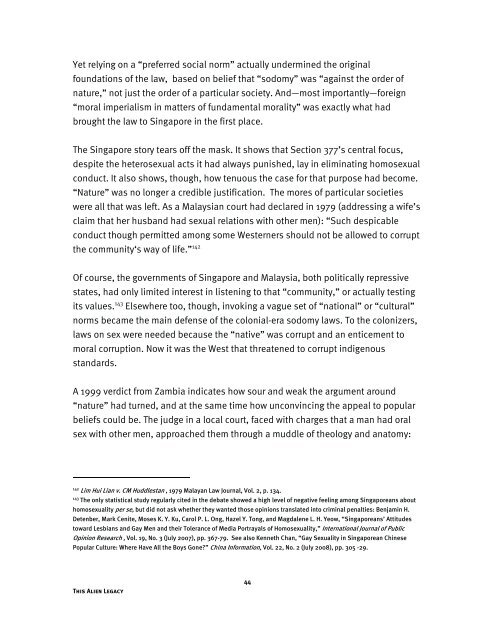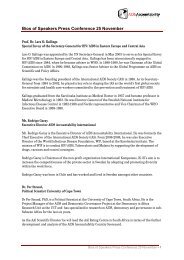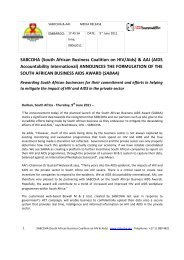This Alien Legacy
This Alien Legacy - Human Rights Watch
This Alien Legacy - Human Rights Watch
- No tags were found...
Create successful ePaper yourself
Turn your PDF publications into a flip-book with our unique Google optimized e-Paper software.
Yet relying on a “preferred social norm” actually undermined the original<br />
foundations of the law, based on belief that “sodomy” was “against the order of<br />
nature,” not just the order of a particular society. And—most importantly—foreign<br />
“moral imperialism in matters of fundamental morality” was exactly what had<br />
brought the law to Singapore in the first place.<br />
The Singapore story tears off the mask. It shows that Section 377’s central focus,<br />
despite the heterosexual acts it had always punished, lay in eliminating homosexual<br />
conduct. It also shows, though, how tenuous the case for that purpose had become.<br />
“Nature” was no longer a credible justification. The mores of particular societies<br />
were all that was left. As a Malaysian court had declared in 1979 (addressing a wife’s<br />
claim that her husband had sexual relations with other men): “Such despicable<br />
conduct though permitted among some Westerners should not be allowed to corrupt<br />
the community‘s way of life.” 142<br />
Of course, the governments of Singapore and Malaysia, both politically repressive<br />
states, had only limited interest in listening to that “community,” or actually testing<br />
its values. 143 Elsewhere too, though, invoking a vague set of “national” or “cultural”<br />
norms became the main defense of the colonial-era sodomy laws. To the colonizers,<br />
laws on sex were needed because the “native” was corrupt and an enticement to<br />
moral corruption. Now it was the West that threatened to corrupt indigenous<br />
standards.<br />
A 1999 verdict from Zambia indicates how sour and weak the argument around<br />
“nature” had turned, and at the same time how unconvincing the appeal to popular<br />
beliefs could be. The judge in a local court, faced with charges that a man had oral<br />
sex with other men, approached them through a muddle of theology and anatomy:<br />
142<br />
Lim Hui Lian v. CM Huddlestan , 1979 Malayan Law Journal, Vol. 2, p. 134.<br />
143<br />
The only statistical study regularly cited in the debate showed a high level of negative feeling among Singaporeans about<br />
homosexuality per se, but did not ask whether they wanted those opinions translated into criminal penalties: Benjamin H.<br />
Detenber, Mark Cenite, Moses K. Y. Ku, Carol P. L. Ong, Hazel Y. Tong, and Magdalene L. H. Yeow, “Singaporeans’ Attitudes<br />
toward Lesbians and Gay Men and their Tolerance of Media Portrayals of Homosexuality,” International Journal of Public<br />
Opinion Research , Vol. 19, No. 3 (July 2007), pp. 367-79. See also Kenneth Chan, “Gay Sexuality in Singaporean Chinese<br />
Popular Culture: Where Have All the Boys Gone?” China Information, Vol. 22, No. 2 (July 2008), pp. 305 -29.<br />
<strong>This</strong> <strong>Alien</strong> <strong>Legacy</strong><br />
44




